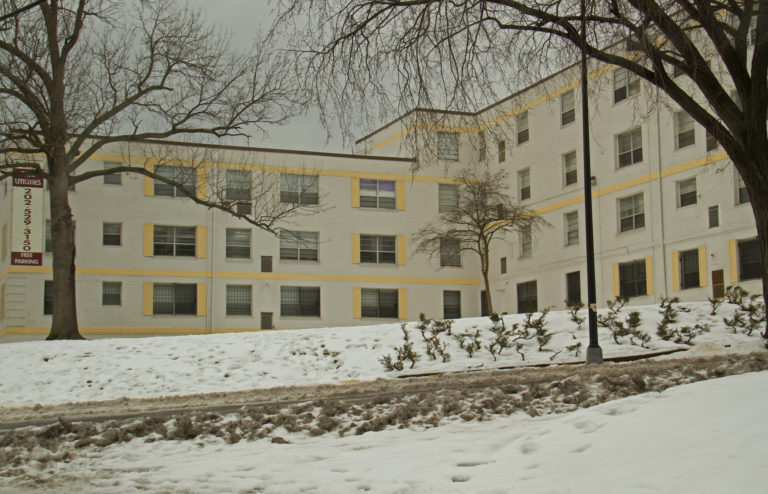This story was first published by DCist on March 5.
The D.C. Court of Appeals has ruled against a legal challenge to a developer’s plans to revamp Brookland Manor in Northeast D.C.
The appeal, which challenged the D.C. Zoning Commission’s approval of the second stage of the larger project to develop Brookland Manor by the developer MidCity Financial, came from local residents and advocacy organizations who have been fighting against the project for years.
Minnie Elliott, the 83-year-old president of the Brookland Manor / Brentwood Village Residents Association who brought the lawsuit, says MidCity’s plans will still push out low-income Black and Latinx residents, in particular because the new units don’t include 4- and 5-bedroom apartments suitable for multigenerational families living on modest incomes.
“It’s the haves and the have-nots,” she says. “That’s what D.C. is becoming. It’s not about people of color, brown or Black people or where they should live.”
The residents also brought up what the court ruling characterizes as “alleged actions taken by MidCity to force current residents to leave Brookland Manor before the commencement of the project.” Previous reporting from The Washington Post in 2016 found a pattern of predatory eviction filings at MidCity.
But the three-judge panel wrote in its decision Thursday that it was “sympathetic” to residents’ underlying concerns about displacement but ultimately “unpersuaded that the Commission’s thorough assessment of MidCity’s plans according to the process set forth in the Zoning Regulations was materially deficient.”
The news was first reported by Washington Business Journal.
In a statement Thursday, MidCity president John Wall said the company is supportive of affordable housing goals.
“The Court’s decision today affirms MidCity’s development plan and the robust commitments we made to the community regarding the preservation of affordable housing,” Wall said. “We are ready to deliver on our commitments and will do so expeditiously by commencing construction on our first two buildings at RIA.”
The issue in question is MidCity’s plan to construct two affordable housing apartment buildings, including a 200-unit building exclusively for seniors, in Block 7, a part of Brookland Manor.
That construction would be a part of MidCity’s Rhode Island Avenue project, which would replace the Brookland Manor Apartments with a “mixed-income, mixed-use destination featuring 1,760 apartments and 181,000 square feet of commercial space, including a full-service grocery store, ground-floor retail, and a 3-acre public park and plaza,” according to a press release from MidCity. The project already received first-stage, broad approval from the zoning commission, and is expected to receive a significant tax subsidy from the District.
The redevelopment, according to the MidCity plan, would include 373 Section 8 apartments, which the developer says will be adequate to accommodate current residents at the old property. MidCity also said it would work with tenants to relocate them during construction. The existing property has 535 total units, 373 Section 8 units, and many others being paid for with housing vouchers, according to the court ruling.
What qualifies as “affordable” housing in an increasingly unaffordable city is one issue at the crux of the dispute. Per the court’s ruling, in its approval of the first stage of the MidCity development, the D.C. Zoning Commission “explained it only considered the existing 373 Section 8 project-based apartments in Brookland Manor to be ‘affordable,’” excluding the remaining units because they were rented at market rate (despite the fact that the people renting them are mostly using housing vouchers).
MidCity executive vice president Stephanie Liotta-Atkinson said the project’s commitment to renewing the 373 Section 8 units was “really historic in terms of the preservation of affordable housing.”
In challenging the second stage of the project, Elliot argued that MidCity’s plans didn’t live up to its commitment in the first-stage approval of the project to ensure housing voucher holders would be able to live in the new development.
But the court found that the zoning commission recognized MidCity’s “general commitment” to a right to return for current residents in its original approval, but didn’t require a guarantee, and “thus necessarily did not require Mid-City to ensure that voucher holders could afford to pay, with the assistance of their subsidy, the market-rate rent.”
Advocates have long worried that setting aside senior-only units at Brookland Manor might force older adults to choose between living in senior-designated housing and living with their families elsewhere.
Many seniors, who are classified as people 65 or older, live with younger family members who would not be able to live with them in housing designated for seniors, Elliot says.
Organizers plan on continuing to advocate for affordable housing that would be able to accommodate families in the new development. More than 115 people gathered virtually earlier this week to protest Ward 5 Councilmember Kenyan McDuffie’s silence on the development project.
“We’re not trying to stop them from building or developing. We just want to make sure people of color will be able to live on this property,” Elliot says. “We won’t go to sleep on it.”
The story of Brookland Manor, Elliott says, is the story of many communities in rapidly-gentrifying D.C. The place is near the bustling Rhode Island Ave Metro station and shopping center.
“Please look closely at Brookland Manor; we are a bellwether for how the District develops and deals with the displacement of its low- and moderate-income Black and Brown people,” Elliott argued in a recent op-ed in The Washington Post.
Liotta-Atkinson said some current residents are supportive of the project. And she said she was “sympathetic to the idea that communications need to improve [with residents] as the project progresses.”
“I understand emotions are running high right now,” she said.
The D.C. Zoning Commission has pledged to “monitor the possibility of displacement carefully” and might “impose additional obligations on MidCity to minimize displacement should that become a concern,” per the court ruling.
Construction on the Block 7 piece of the development project is expected to begin in early 2022 and be completed in 2023.




